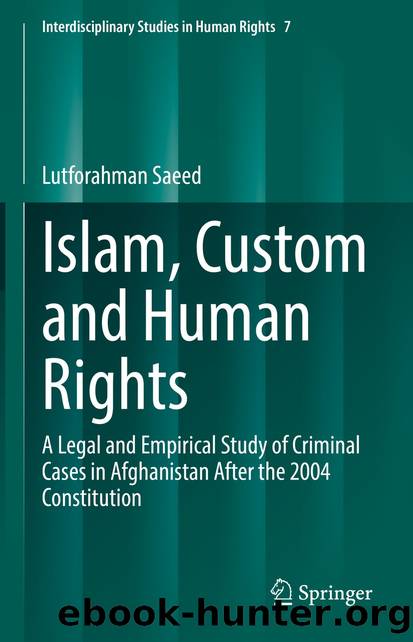Islam, Custom and Human Rights by Lutforahman Saeed

Author:Lutforahman Saeed
Language: eng
Format: epub
ISBN: 9783030830861
Publisher: Springer International Publishing
4.7 Making Decisions According to the Dominant Opinion of the Ḥanafī Doctrine
A common feature of Islamic jurisprudential schools is that there is a variety of opinions regarding one legal issue. The Ḥanafī school of thought is not an exception in this regard. To avoid anarchy in decision-making in accordance with the dominant opinion in the Ḥanafī school regarding a case, Ḥanafī scholars have regulated the hierarchy of the sources and opinions within the Ḥanafī school of thought. These regulated principles are widely accepted in the Ḥanafī school and give legitimacy to legal decisions. Ḥanafī school scholars emphasize that it is the obligation of judges to follow the well-established principles of preference and make decisions accordingly.
A Ḥanafī imitator judge is only authorized to rely on a provision of the Ḥanafī school of thought that is accepted as a dominant opinion by the Ḥanafī scholars. In this regard, there are two standards for a Ḥanafī judge: the first one is that a judge must follow the Ḥanafī school doctrines in his decisions; the second one is that he must respect the principle of preference among the Ḥanafī school doctrines. If a Ḥanafī judge does not make a decision in accordance with the Ḥanafī school doctrines or if his decision is based on Ḥanafī school opinions but does not respect the principles of preference within the Ḥanafī school, then the decision is not valid and must not be implemented.129 Thus, Ḥanafī scholars regulate Ḥanafī school opinions and sources in terms of strong or weak opinions and trustworthy or nontrustworthy sources.
There are concrete principles, which are called (qawÄÊ¿id al-iftÄʾ) Principles of Issuing fatwa (legal opinion), that regulate the preference of opinions within the ḤanafÄ« school. The hierarchy of scholars and their opinions require judges, when making decisions, to search for the answer among the ḤanafÄ« scholarsâ opinions from top to bottom. For example, if there is an opinion from one of the first-class scholars, Imam AbÅ« ḤanÄ«fa, Imam AbÅ« YÅ«suf, or Imam Mohammad, regarding a case, the judge should not make a decision according to the opinion of a second-class scholar (their students). If there is any conflict of opinions within the school, they are resolved by the preference rules.
A ḤanafÄ« imitator judge cannot go beyond the doctrines of his own school and make a decision based on other schoolsâ opinions. The imitator judges must follow their own school of thought and cannot go against the doctrines of their school.130 ḤanafÄ« scholars clearly state that if an imitator judge, like the current judges in Afghanistan, makes a decision not in accordance with the ḤanafÄ« school doctrines, their decision is not valid and must not be implemented.131
To analyze the court decisions in the cases under study in this work, it is necessary to discuss the principles of preference and the hierarchy of the sources within the Ḥanafī school of thought in greater detail and then examine whether the court made its decision in accordance with these norms. Following a brief explanation of the principles of
Download
This site does not store any files on its server. We only index and link to content provided by other sites. Please contact the content providers to delete copyright contents if any and email us, we'll remove relevant links or contents immediately.
Machine Learning at Scale with H2O by Gregory Keys | David Whiting(4280)
Killers of the Flower Moon by David Grann(4023)
Oathbringer (The Stormlight Archive, Book 3) by Brandon Sanderson(3109)
Will by Will Smith(2891)
Once Upon a Broken Heart by Stephanie Garber(2817)
Guns, Germs and Steel by Diamond Jared(2350)
It Starts With Us (It Ends with Us #2) by Colleen Hoover(2317)
Borders by unknow(2297)
Friends, Lovers, and the Big Terrible Thing by Matthew Perry(2208)
The Room Where It Happened by John Bolton;(2140)
The Color of Law by Richard Rothstein(1913)
The Strength In Our Scars by Bianca Sparacino(1828)
HBR's 10 Must Reads 2022 by Harvard Business Review(1828)
A Short History of War by Jeremy Black(1827)
A Game of Thrones (The Illustrated Edition) by George R. R. Martin(1692)
Water Rights and the Environment in the United States by John Burch(1670)
515945210 by Unknown(1653)
Examples & Explanations: Administrative Law by William F. Funk & Richard H. Seamon(1628)
That Every Man Be Armed by Stephen P. Halbrook(1569)
